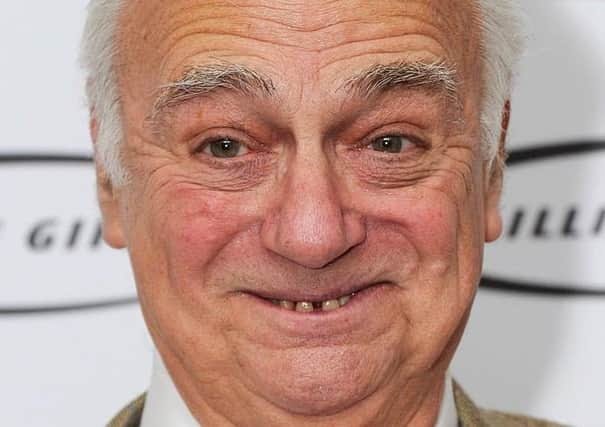Obituary: Roy Hudd, comic, actor and authority on music hall


The goofy, gap-toothed smile, a twinkle in the eyes and an obvious delight in story-telling and in life – there was something intrinsically jolly about Roy Hudd.
He was old-school, silly, knockabout, slapstick, with little obvious sign of the demons that have haunted so many comedy greats… except he recalled in his memoirs that other children mocked him as the boy whose mum put her head in a gas oven, and much later in adult life he went over the memories in his mind and had a nervous breakdown.
Advertisement
Hide AdAdvertisement
Hide AdComedy and laughter were an escape and a passion for Hudd, and his philosophy was clearly to always look on the bright side of life, and then laugh at it.
Hudd had his own comedy shows on television and radio. Hudd (1965) and The Illustrated Weekly Hudd (1966-67) made him a household name at a time when Britain had only three television channels. On radio, The News Huddlines, a mix of topical sketches, songs and satire, ran for 26 years from 1975 to 2001 when BBC executives told him he was too old-fashioned and suggested he study Jonathan Ross. “I said, ‘Where’s my hat? I’m off.’ ”
He wrote gags for Labour Party conferences, suggesting that Michael Heseltine was the Kama Sutra of the Conservative Party – “He’s been in every position except Number Ten” and his comedy was full of double meanings rather than swear words and vulgarity. Hudd started off in variety shows in the 1950s, appeared with the great Max Miller, and latterly became a published author and leading authority on music hall. He loved panto – wrote, directed, cast and starred in them. He won a SWET Award, the predecessor of the Oliviers, in 1982 for his performance as Bud Flanagan in Underneath the Arches, which he co-wrote. Just last year he appeared at the King’s Theatre in Edinburgh in a production of Oscar Wilde’s A Woman of No Importance. He even appeared in opera alongside Alfie Boe in The Merry Widow in 2008.
But it is a thin line between comedy and tragedy. He had played Fagin in a revival of Oliver! in 1977. He was in the films Up Pompeii (1971), with Frankie Howerd, and The Magnificent Seven Deadly Sins (1971), with a Who’s Who of British comedy, including Spike Milligan, Marty Feldman and June Whitfield, his friend and co-star on Huddlines. But before that he was in the X-rated horror film The Blood Beast Terror (1968), with Peter Cushing. He played a morgue attendant. And he was a regular on Coronation Street in 2002-03, as undertaker Archie Shuttleworth.
Dennis Potter wanted him for Pennies from Heaven (1978) for the travelling salesman role that was eventually played by Bob Hoskins. He did have major roles in Potter’s excellent ensemble drama Lipstick on Your Collar (1993), with a young Ewan McGregor, and his rather disappointing swansong Karaoke (1996). As a serious actor Hudd could be sad and even downright creepy as he pushed his characterisations across the line.
Hudd was born in the London borough of Croydon in 1936. His father was a joiner. His parents split up when he was very young and he ended up with his mother’s mother, Granny Alice, while his brother went to live with an aunt.
Hudd was still very young when his mother committed suicide. He later wrote in his autobiography A Fart in a Colander (2009): “One afternoon… I asked outright: ‘When am I going to see Mum?’ ’Your Mum’s dead,’ Gran replied, in a totally untypical short way, adding the oddest postscript ever, ‘and there’s no Father Christmas’. A terrible double whammy. I fled into the house, threw myself onto my bed and bawled my eyes out. I’m ashamed to say I’m still not sure what upset me most – losing Mum or losing a Christmas stocking.”
Hudd said the suicide was never discussed. “They all came from a generation in which suicide was considered an unforgivable and disgraceful act.”
Advertisement
Hide AdAdvertisement
Hide AdHudd dealt with the sadness by being funny, making himself and others laugh. The title of his autobiography A Fart in a Colander came from an expression that his grandmother used to describe him, meaning that he could not be easily contained. She took him to music hall on Friday nights and sowed the seeds of his abiding passion.
After leaving school, Hudd studied commercial art and did national service in the RAF, during which he arranged shows and played the banjo. He worked as a redcoat at Butlin’s in Clacton, Essex, along with his early stage partner Eddie Kay – styling themselves The Awkward Pair – and a couple of other hopefuls called David O’Mahony and Harry Webb, who enjoyed some success after changing their names to Dave Allen and Cliff Richard.
His big break came when Ned Sherrin hired him for the TV show Not So Much a Programme, More a Way of Life (1964-65), his silliness a counterbalance to the more sophisticated humour of David Frost, Eleanor Bron and John Bird. He was so popular that he was given his own show. His popularity peaked in the 1960s, but he retained a loyal audience on radio and found new audiences on stage and in print.
As well as writing about the music hall days, he was a great collector of memorabilia. He was awarded an OBE for services to entertainment in 2004. He is survived by his second wife Debbie, a former dancer, whom he met in panto, and by a son Max, named after Max Miller, from an earlier marriage which ended in divorce.
Brian Pendreigh
Comments
Want to join the conversation? Please or to comment on this article.